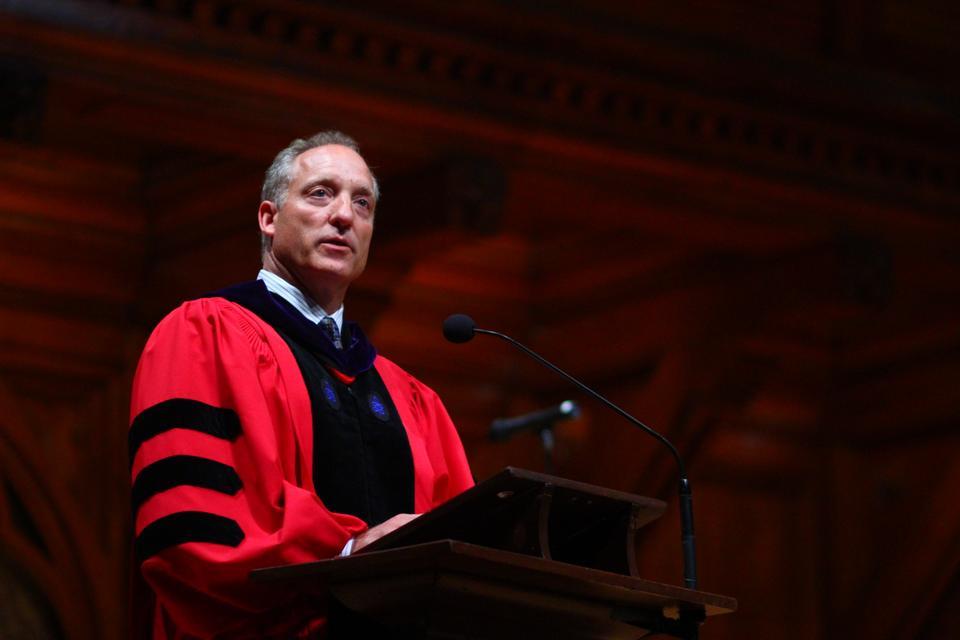
News
Summers Will Not Finish Semester of Teaching as Harvard Investigates Epstein Ties

News
Harvard College Students Report Favoring Divestment from Israel in HUA Survey

News
‘He Should Resign’: Harvard Undergrads Take Hard Line Against Summers Over Epstein Scandal

News
Harvard To Launch New Investigation Into Epstein’s Ties to Summers, Other University Affiliates

News
Harvard Students To Vote on Divestment From Israel in Inaugural HUA Election Survey
FAS Will Cut Grad Student Admissions by 4.4 Percent

Facing budget constraints due to an underperforming endowment and dwindling cash reserves, Harvard’s Faculty of Arts and Sciences has reduced the number of admissions slots for graduate students this year by 4.4 percent, according to FAS Dean Michael D. Smith.
In an interview Friday, Smith said the decrease in admissions is attributable to “the flat endowment distribution that we will see next year and the drying up of some funds that we’ve used in the past to help admit some students.”
In fiscal year 2016, Harvard’s endowment dropped almost $2 billion in value after Harvard Management Company returned negative 2 percent on its investments, prompting concern from University President Drew G. Faust. In November, a report on the University’s finances warned University budgets could be “significantly constrained” for years to come.

With these constraints in mind, Smith said he must focus on students currently attending the University before potential new students.
“Those [admissions cuts] are painful because there’s some fantastic individuals out there that are trying to come into our graduate school, that we’d love to have a part of our community,” Smith said. “But I also have to be thoughtful about the individuals I already have on campus, making sure that they have as outstanding a student experience as possible.”
Beyond cuts to GSAS admissions, other FAS priorities will also feel pressure of diminished financial resources. The renovation of Lowell House, slated to begin this summer, will in part be funded by debt taken out by FAS, according to Smith. However, Smith said he was confident that the debt funding will not affect the current Lowell renovation timeline.
“We’re definitely going forward on Lowell,” Smith said. “It will be renewed unless the whole world collapses tomorrow.”
This marks the first time in the University’s years-long series of House renewals that a project will be partially funded by debt, though Smith said that FAS had been planning to take out debt for some time.
As other areas of the University’s record-breaking capital campaign have surpassed their goals ahead of the campaign’s scheduled 2018 end, FAS has made a concerted effort to focus on House renewal funding, which has still falls short of its fundraising goal.
FAS has had mixed success securing funding for House renewal. Last year, Winthrop House, which is currently under renovation, renamed a building following a donation of an undisclosed sum by Robert M. Beren ’47. Last year, Smith suggested that FAS may soon allow donors to endow Faculty Dean positions in the House of their choice to raise funds.
“We’re into the projects now that are quite expensive and we’re not getting $100 million dollar gifts. Those are few and far between,” Smith said. “We use some of our reserves in this space and we use some of this endowment. The purpose of having an endowment is being able to use it in times like this.”
Lowell, the fifth house to be renovated as part of FAS’s House renewal project, will be the longest and most complicated renovation thus far. Students are slated to return to a renovated Lowell in the fall of 2019.
—Staff writer Joshua J. Florence can be reached at joshua.florence@thecrimson.com. Follow him on Twitter @JoshuaFlorence1.
.
Want to keep up with breaking news? Subscribe to our email newsletter.
